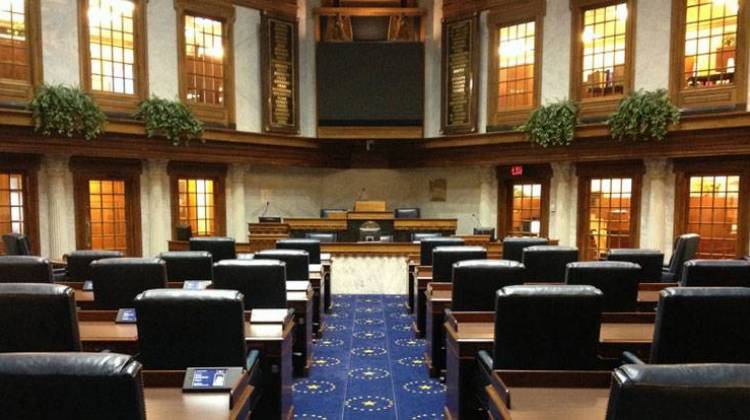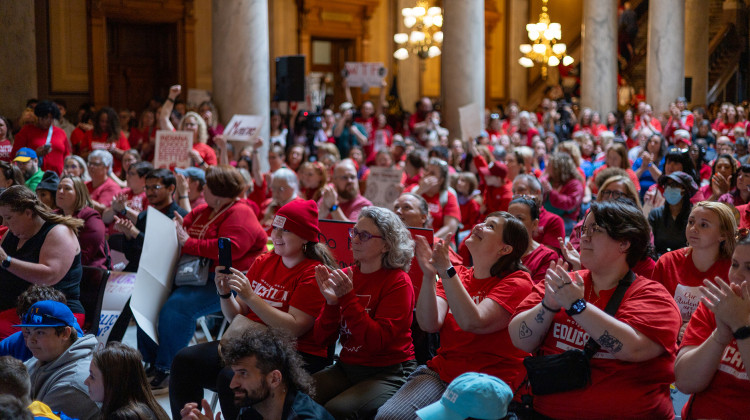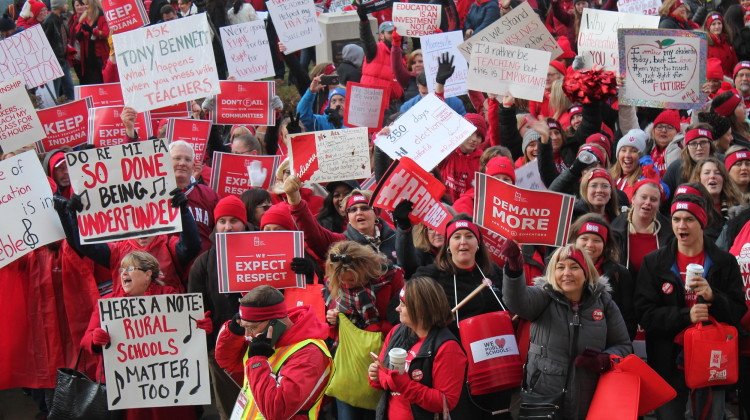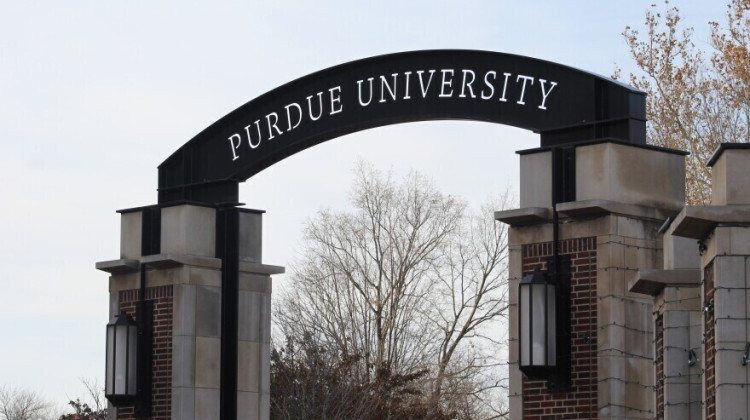
If Senate Bill 518 becomes law, the legislation would gradually redirect millions of dollars each year from traditional public schools to charter schools
WFYI File PhotoUpdated 2:35 p.m., Feb. 21, 2025
Have a news tip for WFYI's education team? Share it here.
Indiana Republican lawmakers moved closer to requiring some public school districts to share local property tax revenue with charter schools for the first time.
If Senate Bill 518 becomes law, it would significantly change how charter schools are funded since Indiana first authorized the schools in 2001.
The legislation would require school districts with at least 100 students attending an eligible charter school to share their operations fund levy with charters starting in 2028. It also mandates that all districts must share debt service levy funds with eligible charter schools, regardless of enrollment numbers.
Sen. Linda Rogers (R-Granger), the bill’s author, said 36 school districts meet the 100-student threshold.
The timeline to share property tax revenue with charter schools varies by funding type.
Starting in 2026, school districts must immediately begin sharing revenue from capital referendums and newly approved school construction projects, with no phase-in period. Debt service levy sharing begins in 2026 but phases in gradually to 2028.
The operations fund is tax levy revenue that covers non-classroom expenditures like transportation, bus replacement, and capital projects. Districts would share it following a phased schedule based on how many students living within a district boundaries attend a charter school, beginning in 2028:
- Districts with fewer than 500 charter school students will phase in revenue sharing over three years (2028-2030).
- Districts with between 500 and 5,000 charter school students will phase in sharing over four years (2028-2031).
- Districts with more than 5,000 charter school students—such as Indianapolis Public Schools—will phase in over five years (2028-2032).
According to the Legislative Services Agency, Senate Bill 518 is projected to redirect $124.4 million from school districts to charter schools over three years.
Rogers said the phase-in period will allow school districts time to assess budget impacts, including those from Senate Bill 1, the state’s property tax reform. The current version of that proposal is projected to shift more than $370 million in property tax revenue away from public schools over three years.
“This provides school corporations plenty of time to make any needed budget adjustments,” Rogers said.
Senate Bill 518 passed the Senate on Thursday in a 28-21 vote after hours of debate. It now heads to the House, where additional changes could be made.
Ongoing debate over charter school funding
The fight over Senate Bill 518 highlights ongoing tensions about the future of Indianapolis Public Schools as charter advocates push for a larger share of property taxes.
Rogers said extending the phase-in period was a compromise aimed at IPS, giving the district time to “right-size” its operations.
“It gives them an opportunity to figure out why they're doing what they're doing,” Rogers said.
Sen. Shelli Yoder (D-Bloomington) questioned the potential consequences of Senate Bill 518 and Senate Bill 1 on public school budgets.
“What if the impact of Senate Bill 1 and 518 ends up such that our school corporations actually cannot function, that they cannot continue,” Yoder said. “What then?”
Yoder called for the state to conduct a study of regions with high charter school enrollment to “have the information we need in order to make the smartest move in our districts.”
Rogers told WFYI that the phased-in approach to property tax sharing would prevent financial destabilization in public school districts.
“They have three years right now to at least look forward,” she said.
According to the Legislative Services Agency, Senate Bill 518 would redirect an estimated $124.4 million to charter schools over three years. An additional $436 million in property tax revenue would be redistributed among public school districts during the same period. These figures are expected to change following Rogers’ amendment.
Rogers said she would be open to adjusting the legislation if school districts struggle under the new funding model.
“We can always take a look at the fiscal impact and make adjustments as we go forward,” Rogers said.
Charter school eligibility and restrictions
Under the bill, ny school district that adopts a property tax levy for a capital referendum or debt service levy after May 10, 2025, must allocate a portion of the revenue to eligible charter schools. However, operating and school safety referendums are only subject to sharing if at least 100 students from the district are enrolled in a brick-and-mortar charter school.
Only charter schools physically located within a district’s attendance boundaries are eligible to receive these funds. Virtual charter schools and adult high schools are excluded from all forms of property tax sharing under the bill.
A current law already requires districts in four counties to share referendum proceeds with eligible charter schools.
Unlike traditional public school districts, which receive local property tax revenue, charter schools primarily rely on state funding. However, charter schools have consistently received more per-student state tuition support than traditional school corporations, according to a report from the Legislative Services Agency.
The bill also changes how charter schools qualify for state grants, tying future funding levels to the amount of property tax revenue they receive.
Additionally, charter schools that receive local tax dollars will be prohibited from promoting school referendums, mirroring existing rules for traditional public school districts.
Charter schools are tuition-free public schools managed privately by nonprofit boards instead of elected officials. These boards operate under contracts granted by one of several state-approved authorizers.
Democrats push to slow charter school expansion
Lawmakers also debated broader regulations for charter schools, particularly in Marion County, where new charter schools open and close frequently.
Sen. Andrea Hunley (D-Indianapolis) proposed an amendment to place a moratorium on new charter schools in the county until 2030.
“If new schools are coming online and schools are closing at a rapid rate, it's very hard to determine what the fiscal impact is when you have an ever changing landscape,” Hunley said.
Rogers, however, pushed back against the idea of limiting school choice.
“Stopping growth of options, it's really a bad policy and bad for families,” Rogers said. “Stabilizing enrollment is not a reason to go against the long standing policy in Indiana to value parental options in education.”
Hunley and other Democrats introduced several amendments aimed at limiting the impact on IPS and other public school districts, but all Democratic amendments failed along party lines.
IPS responds
On Friday, the Indianapolis Public Schools Board issued a statement following the Senate passage of Senate Bill 518.
The board said they want provisions added to help stabilize the district, including a two-year moratorium on new schools opening within district boundaries.
“We do not need more schools,” the board wrote in its statement.
They also called for the Indianapolis Mayor’s Office of Education Innovation to be the sole authorizer for charter schools within IPS boundaries.
“We believe that if these key considerations are put in place, our community will be much better positioned to create a more sustainable future for all children within our boundary than the one we have today,” the board wrote. “It does not mean that there won’t be challenging conversations ahead—there will.”
WFYI education editor Eric Weddle and reporter Sydney Dauphinais contributed to this story.
Rachel Fradette is the WFYI Statehouse education reporter. Contact Rachel at rfradette@wfyi.org.
 DONATE
DONATE






 Support WFYI. We can't do it without you.
Support WFYI. We can't do it without you.